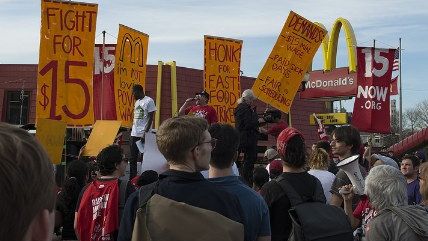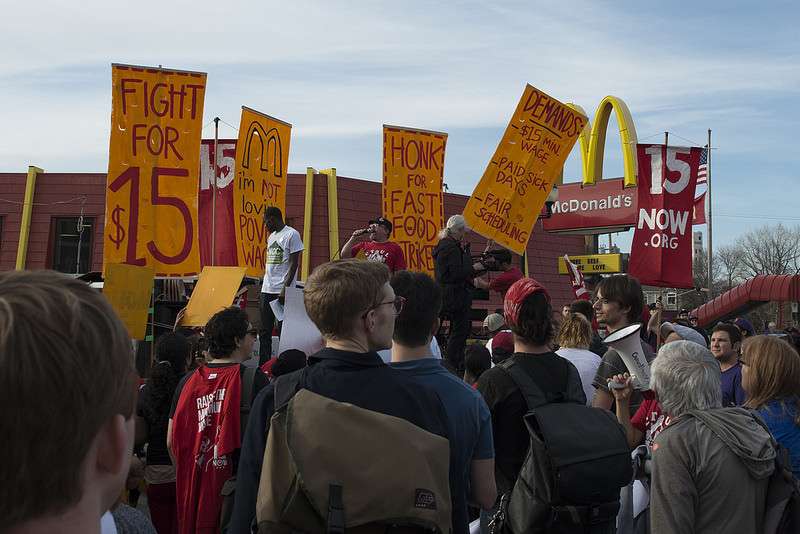Increasing the Minimum Wage Does Create Jobs! For Government Employees.
L.A. County creates enforcement squad, considers more business licensing.


Both Los Angeles County and the City of Los Angeles have approved eventual increases of the minimum wage to $15 an hour. But it apparently won't mean much if employers don't comply. Concerned that state agencies in California will not make it a priority to enforce a minimum wage higher than the state requires, both the city and county will be creating their own wage enforcement squads. The county voted theirs into being Tuesday afternoon. Via the Los Angeles Times:
Details of how the enforcement program will work and what penalties will apply to offending employers remain to be worked out. As part of the program, the county could revamp its business permitting system to require more businesses in unincorporated areas to get county licenses.
The move to create a wage enforcement program was hailed by labor groups that had pushed for such a program, saying that without it, many workers will not actually benefit from the higher minimum wage.
"It sends a strong message to employers, especially those that don't play by the rules," said Supervisor Hilda Solis, who led the push for an enforcement division along with Supervisor Mark Ridley-Thomas. "Now there will be a spotlight."
The minimum wage increase may also result in the expansion of government licensing mandates requiring more people to get official permission to engage in commerce. That was actually one bad consequence of increasing the minimum wage I wasn't even expecting. Reporter Abby Sewell notes that only one-third of the estimated 15,000 businesses in unincorporated Los Angeles County are licensed by the county. It currently only requires businesses with health and safety impacts to license with the county to do business.
So the county is going to create a new enforcement bureau and possibly expand existing bureaucracy, meaning there will likely be a need for additional staff. The county has set aside $408,000 to set up this enforcement squad.
I'm pointing all this out not just because I'm a critic of the minimum wage increase, but to hammer home the idea that increasing the minimum wage is not about making Walmart pay out more or snatch money from those fat cats on Wall Street, despite what we may hear from the likes of Bernie Sanders. From the Los Angeles Daily News, here's how proponents of the wage enforcement squad described the abuses that take place:
One workers' rights attorney said she represented bakery employees who have to be at work at 3 a.m.
"They work for 10 to 12 hours. They make basically three dollars an hour and that has not been the minimum wage in almost 35 years," said Yanin Senachai of Asian Americans Advancing Justice.
Another advocate said abuses were "often indistinguishable from human trafficking cases," telling the story of a woman who was forced to go to the bathroom in a bucket because she wasn't allowed to leave the kitchen where she worked.
A report by the county counsel found that the percentage of wage abuses were highest in the garment industry, with workers in domestic services, building services and retail businesses also experiencing high levels of wage theft.
I question the claim that these cases are "indistinguishable" from human trafficking cases (is she being dragged into the place by force every morning?), but it's de rigueur to define "trafficking" down these days to encompass people making decisions you don't think are in their own best interest (see: voluntary prostitution).
My point, though, is that it's probably not going to be the major players this squad will be going after (though certainly there have been stories of big box retailers not paying employees properly). Small bakers and garment shops and other small businesses will end up on the county's radar once they're forced to be licensed. And when these workshops that operate on very small margins are forced to pay wages they can't support, they're either going to shut down or those immigrants these people insist they're trying to help are going to be pushed out. That kitchen worker might not even have a bucket to piss in when it's over.
Just as with the recent New York City coverage and meddling on Korean-owned nail salons, there's a nanny state mentality that these folks believe that they're helping or saving immigrants from exploitation, even though their solution is likely to make life worse for these very same folks and simply erase these immigrants' own agency and ability to work. But immigrants of varying backgrounds and nations of origin don't have the same power and influence over municipal government that the unions pushing the wage increases do.


Show Comments (63)